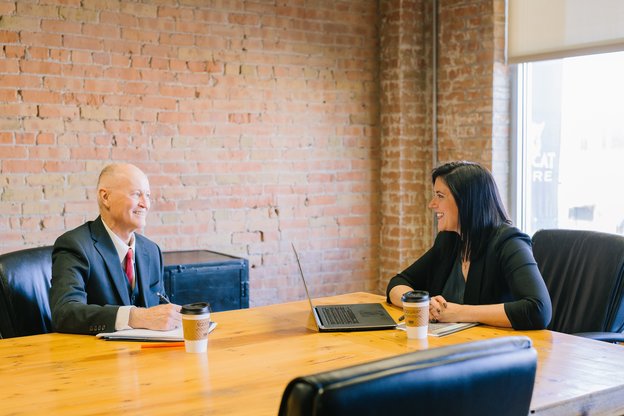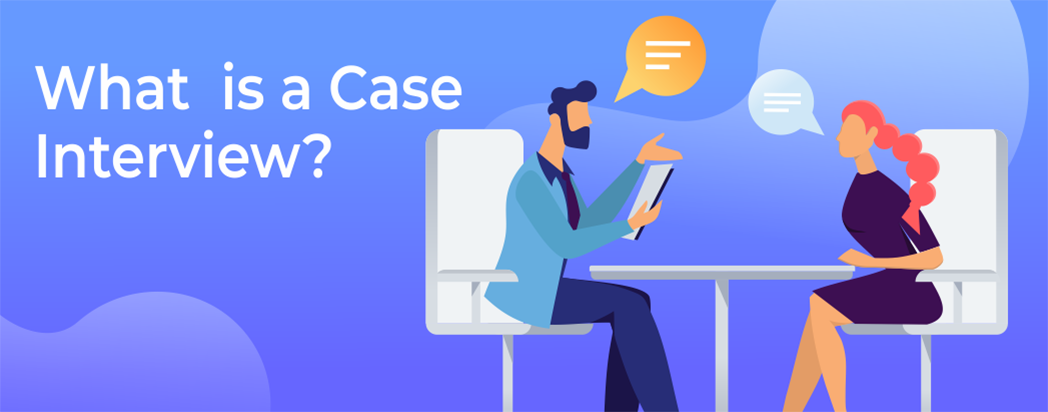
What you will learn:
Learn the basics of a case interview – what it is, how they are different from a regular job interview, who uses them, why they are used, and the types of case interview formats and the difference between them.
Topics Covered:
What is a Case Interview?
A case interview is a hypothetical business situation that is presented during an interview process to determine how a candidate thinks about a particular problem and how they would solve it.
The key point to understand about a case interview and the case interview process is that it is designed to simulate life on the job as a management consultant. It replicates all of the stages of a three- to six-month engagement in approximately thirty or forty minutes.
In the medical profession when you are learning to be a doctor, you are often asked to present a medical case of a patient. You have to describe how you would potentially treat this particular patient. What diagnostic test would you run, why would you run them, what diseases or illnesses do you suspect, and why? As you get different tests results back, how would you interpret them to determine whether your initial thoughts and impressions were correct?
In the management consulting field, you get something very similar. In this case, your patient is not a person, your patient is a company. For example, you might be presented with the case of a client who manufactures automobiles. Their chief concern is what they should be doing as a business with respect to electric vehicles and cars that can drive themselves. They want your advice on what they should do.
That is a hypothetical case situation that you would be asked to address and to solve. The purpose of the case interview is to see how you would approach a problem.
Here’s why that is important:
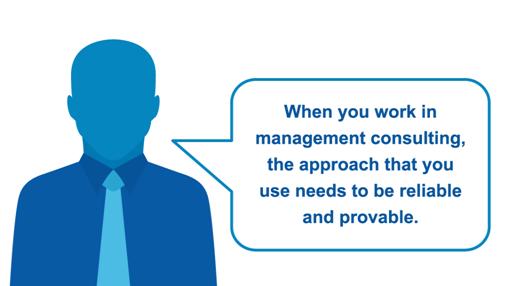
When you work in management consulting, the approach that you use needs to be reliable and provable. You need to find an answer and recommendation for your client. It doesn’t help if you are able to intuitively make a recommendation to clients if that process of coming up with a recommendation is not repeatable.
Let me back up. One of the concerns that a firm often has in hiring its new consultants is that candidates follow a protocol methodology to consistently analyze data and derive fact-based conclusions from that data. Management consulting firms have an enormous buy-in for conclusions that can be supported by data, mostly because the data makes it easy to defend and justify the conclusion to clients.
It is not helpful to give clients a recommendation that may be correct if you can’t prove that it is correct. Your client is usually a CEO or other C-level executive in a large company. They have to justify their plans to others higher up, such as their boss, the board of directors, their shareholders, etc. They often have to justify their decisions because they are a publicly traded company.
This buy-in trickles all the way down into the kinds of consultants that large companies prefer to hire. They prefer to hire consulting firms that can justify their recommendations, which in turn prompts the management consulting firms to hire future employees who have the ability to approach problems and solve them in a way that is based on data.
The purpose of the case interview is to figure out and observe how you handle these business situations. What analysis do you want? What are you looking for? What working theories or hypotheses do you have? Ultimately, the interviewer wants to know how well you can prove your case in terms of data-derived recommendations.
Case interviews are a really great way to see how a candidate thinks. The case interview originally started with the management consulting field. It started many decades ago and has since been broadened to be adopted in other industries as well.
I have heard that a form of the case interview is used in hiring for software engineering, for example. Let’s say that your client has this technical problem with your products. How would you think about troubleshooting this particular issue? What factors would you consider? What things would you like to do? Why? How do they play together in your overall plan? That kind of a thing.
I have also heard that it is used in private equity firms. For example, if you were trying to get a position in a private equity investment firm that has a particular style or strategy for investing, I have heard of cases being presented in those situations.
I have heard of the case interview being used in jobs in industry, particularly in those such as internal consulting departments. Fortune 500 companies, for example, commonly use them. Sometimes analytical departments or analysis groups use them. Or, sometimes there is a case interview to see how a candidate thinks about approaching a particular analysis.
It is used more and more broadly these days. But the origin, or at least the origin that I am familiar with, stems from the management consulting interview, and it is used as a way to evaluate the way that a candidate thinks about and addresses a particular problem.
Consulting firms, in particular, are looking for several skills to be demonstrated by a candidate in a case interview.
These skills include:
- Problem Structuring
- Logical Reasoning
- Analysis
- The Ability to Draw Conclusions from Data
- The Ability to Synthesize or Communicate Your Conclusions
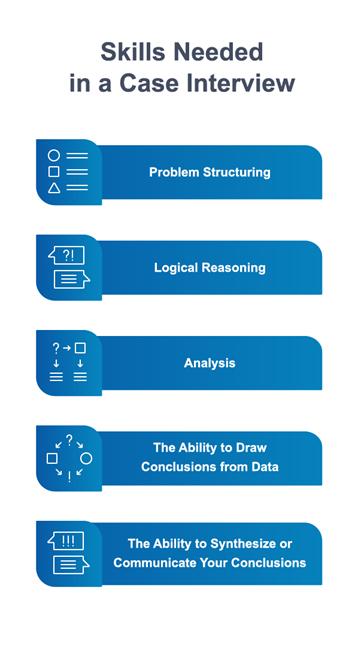
Let me explain what each one means.
Problem Structuring
Problem structuring refers to taking a very large, ambiguous problem and breaking it up into smaller pieces that are easier to digest, analyze, and address. So, the earlier example I gave is that your client is an automobile manufacturer trying to figure out what they should do regarding electric vehicles and self-driving vehicles.
Usually, when I hear a case as a candidate, my first reaction is, “I have no idea what they should do.” It is such a broad, big, amorphous problem. I don’t know what they should do. Should they create an electric car? Should they create all sorts of driving cars? If they should, should it be a copy of what everyone else is doing? Should they do something differently? I don’t know. It’s overwhelming, right?
What I just described is what happens when you try to solve a very large problem in an unstructured way. All you see is problems and headaches. You either don’t know where to begin, you don’t know where to end or you start guessing. Of course, they should have an electric car. Really, given where we are in the world today in relation to climate change, we should absolutely recommend creating a self-driving car and an electric vehicle. Right?
That’s “what not to do,” because you can’t prove it. Why should a client enter the market and have an electric vehicle? What is your justification other than, “I think so,” right?
You need to be able to back up your recommendations with data. So, the first thing that employers want to see in a case interview is not a recommendation, because frankly, you have no data on which to base a recommendation. What they want you to do is take a very, very big problem and break it up into pieces that can then be analyzed.
If I were the candidate, I would want to understand three things to help determine whether the automobile manufacturer should do anything in response to these trends:
- What do customers actually want?
- What are competitors doing and offering today?
- What should we do about it?
The more that I understand about what customers want and what competitors are doing, the better equipped I am to figure out what they should do in response.
That’s an example of problem structuring. I take a very big problem and break it up into three pieces: 1) Customers; 2) Competitors; and 3) Data-Driven Recommendation.
But then there’s simple problem structuring. Problem structuring usually occurs in the first 1 to 4 minutes of a case. It helps to simplify the problem-solving process. Otherwise, the problems that consultants get are so overwhelming that they really have no idea where to start. They need to break things up into smaller pieces.
So, problem structuring is very important, and it is the first thing that the interviewer looks for.
Logical Reasoning
You need to explain why you do everything that you do in a case. The logical reasoning is really important.
For example, if we are looking at customers of the car manufacturer and trying to figure out what they want, we want to break up customers into multiple categories. One of the questions that you may ask is “What types of personas or categories of drivers are out there? I’d like to better understand what each category wants.”
Perhaps there is one segment that really doesn’t care about the way that a car looks, they just want to get there safely with as little hassle as possible. You might have another segment that is very environmentally conscious. The carbon footprint that a vehicle produces may be significant for them.
Their needs may be quite different. So, what we are trying to do is systematically say, “I want to understand the full range of the customers who are out there. I want to understand them by their segment type or by their categories. I want to understand each of their needs in those categories.”
So, that is an example of both problem structuring and explaining logically why I want that information. You always want to explain what you are doing and why you are doing it. That’s super important.
Analytical Reasoning
Analytical reasoning refers to addressing certain problems in a systematic, preferably numerical, way.
For example, you might say, “I would like to know what percentage of the overall market each segment represents.” Are environmentally conscious people one percent of the market or are they ninety percent? That’s a big difference that will deeply affect what my client should do. You are trying to analyze the situation and size of each segment, systematically. That’s analytical reasoning.
Another very common part of analyzing a case is looking for a direction of change. If environmentally conscious customers are one percent of the marketplace, are they growing? Are they shrinking? Is it becoming less favorable? That’s another way that analytical thinking comes into play. You are trying to understand the logical, analytical process.
The same reasoning applies to the competitors. An analytically orientated question might be, “How many competitors are there?” Let’s say there are twenty. Can competitors be grouped into different categories?
Maybe ride-sharing services like Uber are competitors. If you use Uber a lot, maybe you don’t need to buy a car. That could be one kind of competitor.
Another competitor might be a technology company like Google or Apple.
The reasoning process really helps you to understand how big the competitor categories are and how many competitors are in each one. It helps you find some qualitative data about what the competitors in each category are doing. That’s an example of analytical reasoning.
This is the bulk of what you would do on the job as a consultant every day. You’re analyzing some aspect of a case and using the analysis to inform your questions, gather data, and perform calculations to figure out the answer to your question.
For example, the question I asked earlier was, “How many competitors are there?” The analysis might require you to go get customer data, get industry publication data, and count up how many competitors are in the marketplace.
Your next analytical question might be, “How big are they?” You might do some research of financial statements to see how much revenue these companies have, what kind of financial resources they have, or how much cash they have to invest in these new kinds of innovations.
So, those are examples of questioning, data-gathering, and analyzing information to answer questions. I would say about 70% of the case is about having an idea, asking questions to get you closer to a conclusion, gathering data, analyzing data, answering that question, and moving further down the line of reasoning to arrive at a fact-based conclusion that you can then present to the client.
There are times when you will not be able to do a data export from a company to create spreadsheets or build financial models. Case interviews simulate that process. You ask a question, set what kind of analysis you want to be done, and ask the interviewer, “Do you have any such data related to this particular topic?” If you are asking the right questions, the interviewer will have that data for you.
Many case interviews are based on actual client engagements that the interviewer worked on. So, the analyses that you are inclined to run, they’ve already run. You might say, “Is this true? To test this idea, here is the analysis that I would love to run.” In all likelihood, they have already run that analysis and can give you that information.
They truncate and abbreviate the entire analytical process by skipping the middle part — the actual number-crunching. You ask the question, and then you get the answer back from the interviewer.
Deriving Fact-Based Conclusions
You will hear the term “deriving fact-based conclusions” a lot, particularly at firms like McKinsey. They are conclusions based on factual evidence that has been gathered through the case process. In a case interview, this occurs when you ask questions or ask the interviewer if they have data on something.
For example: “How many competitors are there in this marketplace?” That is an example of gathering facts. In a real-life engagement, you would go to the library, you would go to the industry trade association, you might go to an industry conference, you might go to your corporate library to gather data on a particular set of competitors in an industry.
Consultants highly, highly value conclusions that are based on factual evidence and here’s why:
Most client companies have an ample supply of opinions as to what the company should do going forward in a particular industry. The problem is that all of the opinions contradict one another, and you can’t do all of them. So, McKinsey, Bain, BCG, and other consulting firms are quite often brought in to pick or recommend a particular direction to move in that’s based on evidence and facts.
This is how you break ties in executive teams when every executive has a different pet project or a different opinion on what the company should do. A consulting firm will come in, do analysis, and make a fact-based recommendation.
If recommendations are not based on facts, clients typically have a much more difficult time taking them seriously. So, let’s say you have a senior client, which is usually the CEO and maybe seven or eight of the CEO’s direct reports. The seven or eight executives won’t accept your recommendation if you can’t prove it. If you can’t prove it, it’s just an opinion, and they’ve got an opinion too.
You need to show why their opinion is incorrect. The only way that you can do that is with factual evidence. So, the ability to draw fact- or evidence-based conclusions is a valuable skill during the case interview.
For example, as you gather your analysis, you might realize that the biggest companies in the automobile industry — the traditional car manufacturers, Ford, General Motors, Toyota and so on — have the lowest level of activity and innovation around creating self-driving or electric vehicles.
So, the companies that have the highest market share perhaps aren’t the most innovative. And, those companies that are the most innovative don’t have a lot of market share. That would be sort of a sub-conclusion around the state of competition in that marketplace. You would make that conclusion based on specific facts that lead you to it.
The interviewer is looking for your ability to draw out those distinctions and those sub-conclusions as well as final conclusions. You need to link back to specific data that supports your conclusion. That’s an important skill to have.
Synthesis
Synthesis is industry jargon for summarizing the whole case which leads you to a conclusion and a recommended course of action. So, a summary is a restatement of facts. Synthesis is digesting those facts and developing an insight into what the client should do and why they should do it.
Synthesis goes well beyond pure mechanical summarization and creates an insight with action-orientated recommendations. The interviewer is looking for your ability to do exactly that.
Can you take all of the information that you have gathered and data that you have analyzed and draw an insight from it?
Can you find something that the client should do or some observation that may be a little counter-intuitive that you ascertained from the data?
Can you explicitly state that recommendation to the client in a clear and concise way?
That’s the final stage of the synthesis: state your findings, actions, or recommendations in a way that is very client friendly.
Again, because a case interview is essentially an on-the-job simulation, the interviewer is asking himself, “Can I imagine putting you in front of a client and not feeling embarrassed?” This is the ultimate question that they are trying to answer in the case interview.
If you are just expressing opinions about what a client should do without using data and facts, they will not put you in front of a client. They will not. You would completely damage the credibility of the firm and damage the relationship between the firm and the client.
In the synthesis part of the case, the interviewer is looking at the way that you express your summary, conclusion, and recommendations to them. They imagine you delivering the same conclusion and recommendations to a client.
They want to make sure that you are able to speak to a senior-level executive audience in a very confident, clear, matter-of-fact way that is concise. That’s the skill they are looking for in synthesis. That is what they are looking for overall.
A hypothetical situation is used in the case interview as a way to evaluate thinking skills for real-life client engagements. It is a simulation of the overall engagement process. Where a client engagement process might normally take over six months, a case interview forces you to go through the steps in a much more abbreviated fashion. Be prepared.
What is the Difference Between a Case and Regular Job Interview?
Although there are some aspects of a case interview that are like a regular job interview, at their core they are very different for one reason: Every part of a case interview is designed to mirror some aspect of the on-the-job experience in order to find the best potential consultants.
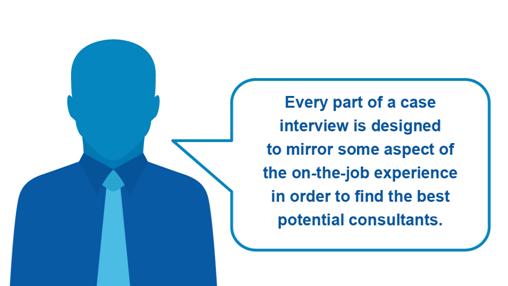
There’s a reason that case interviews have existed for decades. It is the most effective tool in finding the most capable and competent management consultants out there. Once you understand that your interviewer’s only motivation is to test how well you might work with future clients, you’ll find it much easier to prepare and perform in a case interview.
The key is to stop thinking like a candidate and instead put yourself in the shoes of an already-hired consultant. Ask yourself how you would respond to the question you’ve been asked if it were from a client rather than an interviewer.
For example, many real-life client situations will involve estimation questions, this is why there are so many estimation questions in case interviews. Let’s say you have a client wanting to get into the used-car sales market. That client would most likely ask you if you know how big that market is. Using your estimation abilities, you would respond with something along the lines of, “Well, there are 350 million people in America…” and then continue your analysis from there.
The candidates that get taken the most seriously during a case interview are the ones that not only excel in estimation/analytical questions like the one above, but also in their interpersonal skills (a.k.a. not being rude, arrogant or dismissive) because both are critical to succeed as a consultant.
Interviewers test analytical skills by watching for your ability to ask thought-provoking questions, to analyze data to discover new insights, and to develop data-supported conclusions. Perhaps surprising to some, they are also watching for how nervous you get during a case interview. Nervousness or a lack of confidence can translate poorly when it comes to client trust.
If you seem unsure of yourself or your answers when dealing with a client, that client will be more likely to doubt any recommendations you give. They may lose faith in your abilities and the firm as a whole.
When in doubt, always try and think like a consultant and remember why case interviews exist in the first place — to simulate on the job experience.
Who Uses Case Interviews and Why?
Who Uses Case Interviews
Case interviews are used by management consulting firms to assess the problem-solving and analytical abilities of a candidate before hiring. The formats of these interviews differ depending on the firm that you are interviewing with. There are candidate-led case interviews and interviewer-led case interviews.
Candidate-Led Case Interviews
During candidate-led case interviews an interviewer requires the candidate to direct the discussion of the case. Your task as a candidate will be to develop and evaluate your hypothesis while answering the pertinent questions.
BCG, Bain, LEK, Deloitte, and PwC conduct their case interviews using the candidate-led style. They opt for this format because they want to see the applicant’s leadership skills and get a feel for what a real client/consultant conversation would be like if this person were hired.
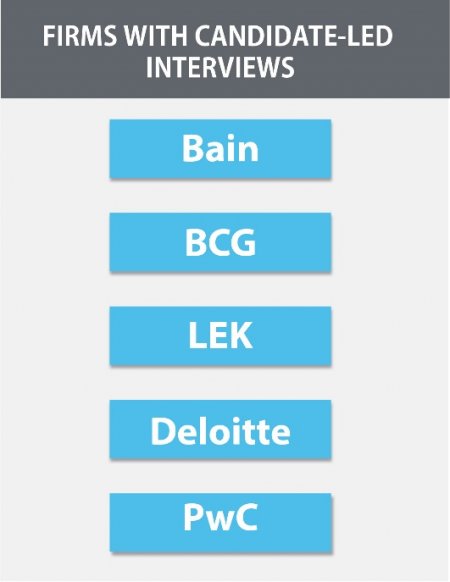
Interviewer-Led Case Interviews
Interviewer-led case interviews have a pre-structured format. The interviewer presents you with a problem (sometimes with or without data) and then asks you a set of pre-determined questions. The same method of approach applies in both formats, but unlike the interviewer-led cases where you solve the case from beginning to end, in the candidate-led, you will jump around to different points of the case.
Interviewer-led case interviews are typically used by McKinsey, Oliver Wyman, Strategy&, and Accenture. This format can be disorienting because you’ve most likely practiced solving the case in chronological order. However, it does allow you to focus on one piece of the case at a time so that you can give a thorough, well thought out answer.
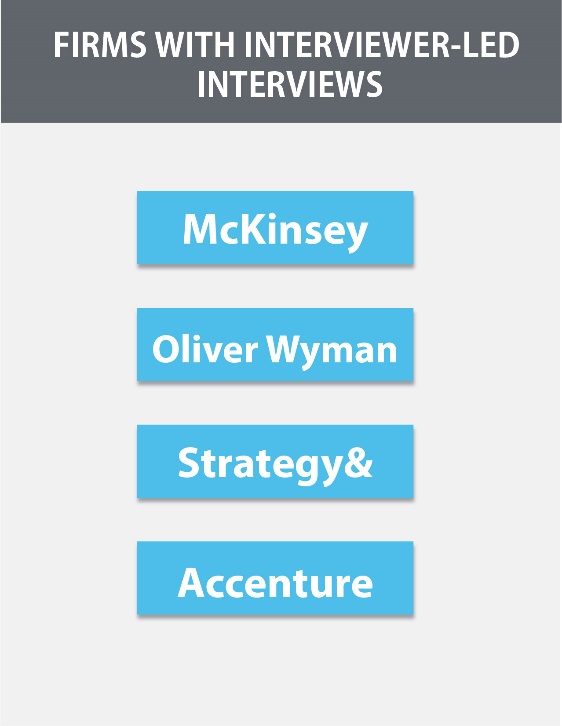
Why Consulting Firms Use Case Interviews
Candidates often wonder why consulting firms do what they do during the interviews. If it’s necessary to ask the questions the way they do, why do they challenge the answers so aggressively? Why do they choose certain assessments options instead of others?
The most basic purpose of the case interview is to see if you can tackle real-life business issues adequately. Candidates are put through this rigorous questioning so that they can prove that they are up to the task, whatever that task may be.
In preparation, some candidates practice many different cases so that they can be ready if they come across new twists, exotic questions, or extremely unusual cases. The actual interview will be a lot less intimidating if you’ve taken the time to work through a lot of possible cases.
Simulating On-the-Job Experience
Firms will spot excellent consultants who have the on-the-job experience they are looking for during the case interviews. Keep these points in mind during your case interview:
- Having a bad attitude during a case interview will tell the interviewer that you are going to have a bad attitude on the job.
- Expect estimation questions. You will most likely not get a lot of questions that have exact answers that you can figure on the spot. In this scenario, the interviewer is testing how well you can get to a logical hypothesis.
- Keep the end goal in mind. Try to think of what qualification the interviewer is testing in the moment and focus on showing your skills in that area
Proving Yourself as a Consultant
Everything that you do in your case interview should help you convince the interviewer that you have what it takes to be a consultant. Try to keep calm and collected, as skepticism may come your way.
Keep in mind, the interviewer not only wants to see your problem-solving skills but also your interpersonal skills. So, what are the ways you can prove your worth and stand as a competent candidate during the interview?
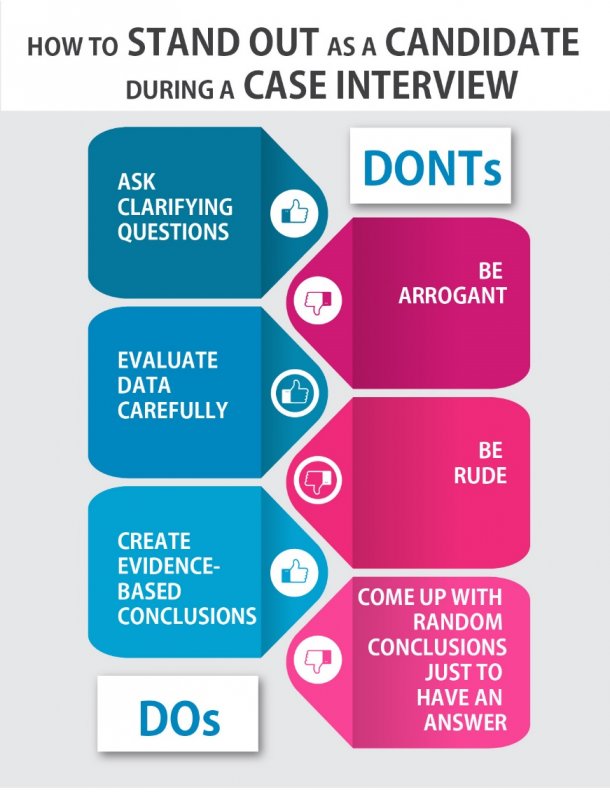
- Ask interviewers clarifying questions
- Evaluate data thoroughly
- Produce evidence-supported conclusions
Usually, the members of the interviewing team are looking for ways to discredit you so they can see your reaction. In such a scenario, it is easy to screw up by doing the following:
- Being dismissive, rude, or arrogant to the interviewer
- Presenting a conclusion that you can’t back with data.
The firms want to see if you possess robust interpersonal skills. Avoid nervousness or low self-confidence when stating a point. The interviewer will see your nervousness as a lack of conviction and will most likely reject a case even when if it is correct. So, try to look confident and make sure to present coherent points.
The case interview is an important process that mirrors real-life business situations. Do your best to display why you are a qualified candidate. Recognize when the interviewer is trying to push your buttons or get you off track. If you can show confidence in your evidence-supported answers, it will make all the difference.
What is the Difference Between a CaseInterview and a Behavioral Interview?
Management Consulting involves both analytical and interpersonal skills. This is because clients demand both.Good consultants are competent at a very advanced level in both disciplines. It is an unusual combination to find in candidates because these skills are so different.
Business analysis is very “logical” or “left-brained,” whereas interpersonal leadership skills are very “soft” or “right-brained.”
Because this combination is so hard to find, firms like McKinsey will consider 40,000 applicants (or some ridiculously high number like that), just to hire a few hundred people each year.
The premise of the case interview is to create a simulation to test your business analysis skills (or general quantitative analysis skills as applied to a business problem).
The rationale is that if you can successfully demonstrate these business analysis skills in a simulated client situation, you are likely to do the same in a real-life client situation.
It is the equivalent of making airplane pilots use a flight simulator before they are allowed to fly a $100-million aircraft.
But, don’t forget that business analysis is only one aspect of the management consulting role.
The other critical aspect is interacting with clients — often under less than ideal circumstances.
Clients typically are in a state of massive disagreement about what to do next — and you are placed in the middle of it.
It is quite common for junior clients to resent you or feel threatened by your presence. They may be reluctant to help you, or they may not feel that you have any valuable ideas to contribute compared to their 25 years of industry experience… and then there is the second day of work. (I’m kidding… but only a little!)
It is very important to be able to handle yourself well in this kind of situation.
If you don’t, it reflects extremely poorly on your firm. If you offend a client, they will tell everyone else at the company that your firm (not you… your firm) consists of a bunch of arrogant jerks and nobody should work with them.
The premise of the behavioral interview is that your previous track record is a predictor of future performance. The interviewer will be asking for examples from your work history where you showed one of two things: 1) Leadership Impact; and 2) Interpersonal Conflict Resolution.
Your responses to these questions will show the interviewer how well you interact with your peers, bosses, clients, or anyone else that you work with on a day-to-day basis.
If dealing with challenging interpersonal situations is something you have done extensively and done well in the past, then it stands to reason that the next time you have an interpersonal challenge, you will be able to handle it.
Similarly, if you’ve shown initiative and promise in leadership positions throughout your career, then it follows that you could have a positive leadership impact in your next position.
Case interviews and behavioral interviews are very different. Where case-based interviews are used to reveal your business analysis skills and predict your on-the-job capabilities, behavioral interviews allow you to showcase the “softer” skills like interpersonal leadership skills.
Both of these skill sets are essential to proving that you are capable of being successful in management consulting.
What are the Types of Case Interview Formats?
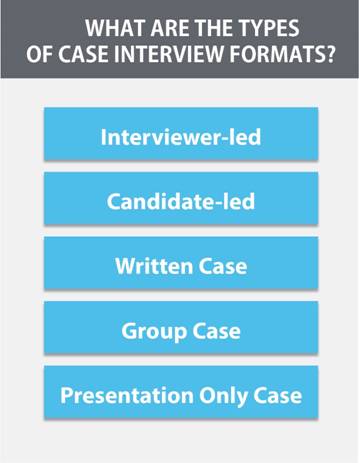
There are a few different formats for a case interview. The format of your case interview will depend on the firm that you are interviewing with, and the specific round. Keep in mind that regardless of format, the same thinking process applies to all interview types.
The interviewer is looking for the answer to this one question: Do you have the skills to be a good management consultant?
Interviewer-Led
An interviewer-led case interview features a highly-structured format where the interviewer controls the focus, tempo, and sequence of the problem-solving process. This format typically consists of five distinct phases.
Here’s an example of the typical interviewer-led format.
- The interviewer would first ask, “Why is profitability in Company X falling? What would be your approach to solve this issue?”
- Regardless of how Question 1 is answered, the interviewer would ask you to estimate the market size of the industry.
- Then, you would be asked to do some quantitative analysis on a particular area, e.g. the effect that raising prices would have on sales (data would be provided).
- After that, you would be asked to list some broad suggestions of ways to increase revenue (pricing, marketing, geographical expansion, etc.).
- Last you would summarize your conclusion.
While the same problem-solving, analytical, and leadership skills are tested across all case interview formats, the primary difference between this format and the others is that you must be prepared for a sudden change of style. You have to be able to transition from one question to another.
The interviewer, not the candidate, is the one that leads the case, its dynamics, tempo and overall structure.
In other words, in an interviewer-led interview, instead of being in the driver’s seat, you are in the passenger seat. No matter where you sit, you are still using the same case interview skills, but using them in a stop-and-go and bits-and-pieces way.
Candidate-Led
In a candidate-led case interview, the candidate is expected to drive the case from start to finish. You will be presented with an open question like, “Your client is considering a merger with its next largest competitor. What should the client do?” You will then lead the interviewer to a solution.
The main objective is for the consulting firm to test if you can handle the entire beginning-to-end problem-solving process.
This format is more unstructured and ambiguous than the interviewer-led format. A good analogy is an interviewer-led case is like taking a math test that has pre-defined, multiple choice questions (the answer is A, B, or C). A candidate-led one is more like an essay question — it is open-ended.
Written Case
The term written case is slightly misleading because it incorrectly suggests that there is a single format called a written case. It’s more accurate to think of the written case as a component that constitutes a portion of the broader case. The skill that is specifically being tested in a written case is data interpretation.
With a verbal case, you are the one coming up with the ideas, asking for the data and determining if the given hypothesis is correct or not. In a written case, someone else has come up with the data and hypothesis, and you must test that hypothesis against the data (a skill that mirrors what day-to-day consulting work is like, especially for a new consultant).
As an associate, your job is to go get the data and figure out if the hypothesis is right or not. This is the main purpose of a written case.
Group Case
In a group case interview, you complete the case as part of a team with other candidates. This format is a close simulation of what life would be like as a consultant. Once you are a consultant, you will work with other team members or with a client.
The key to understanding the purpose of a group case is to understand why some new consultants do poorly on the job.
- Poor Client Management Skills
- Not Invented Here
Poor Client Management Skills
Look at this scenario: A new consultant knows the analytically correct answer, but the client disagrees. The new consultant is eager to prove that they are right and tells the client that they are wrong. The client gets upset. The reputation of the consulting firm is damaged, the client is dissatisfied, and the engagement manager and partner must do damage control.
Not Invented Here
Another reason that new consultants do poorly is that they have a hard time accepting new ideas that they did not come up with.
So, let’s say that a new consultant thinks that the right approach is X. However, someone else on the team says that it’s Y and they have the data to back it up. It is clear that the teammate advocating for Y is right.
Some consultants will have a hard time accepting they are wrong and will push hard for their wrong approach. From an engagement manager’s point of view, a consultant like this (stubborn, inflexible, argumentative) is not one they want to hire. What really matters is not what you think, it is what you can support and prove with the facts.
In both of these above scenarios, a candidate could have done very well in a traditional case interview, as it is a 1:1 format. Traditional case interviews do not test group dynamics and how you manage them like a group case interview does.
Presentation Only Case
In a presentation-only case interview, you’re given one or two hours by yourself to sift through charts and data, develop a hypothesis, structure an issue tree, and analyze your findings. You will then present your findings as a slideshow to the interviewer.
This format emphasizes results rather than processes. It is a true indicator of a candidate’s skill.
The interviewer will not sit back passively and listen to your presentation. Rather, they will challenge every word that you have said and every assertion and conclusion that you have made. In this format, they want to know if you can back up your words with rigorous analysis like you would if you were presenting your findings and recommendations to a client.
No matter the format of your interview, your main goal is to prove that you have what it takes to be a management consultant. If you want to prepare a specific format, do some research or informational interviews to find out what format is used by the firm that you are applying to.
What Are Some Examples of Case Interview Questions?
Consulting interview questions (also called “case interview” questions) differ dramatically from traditional interview questions. In a traditional or behavioral interview, the interviewer will ask questions that tend to begin with “tell me about a time.” For example: “Tell me about a time you had a conflict with a teammate and what you did to resolve that conflict.”
Case interview questions by contrast put you directly into a business scenario. They often begin with “our client.” For example: “Our client is a $2-billion distributor of office equipment whose profits have declined in the last four years. What should they do?”
A case interview is designed to find good consultants by mirroring on the job experience. Everything that happens in a case interview happens because it is simulating some aspect of on-the job experience. This includes the types of questions that are asked in a case interview these types of questions are the types of questions you will be answering for clients as a consultant.
Keeping in mind that consulting interview questions are designed to reflect real life situations you want to make sure when tackling case interview questions, you engage in an interactive problem-solving dialogue to provide a data-driven recommendation or solution to the question being asked. The questions are not about your experience or background, they are about everyday issues that a client may face.
The reason that the interviewer is asking these questions is that they are using the case interview to test you on the work you will do as a management consultant. They offer you realistic scenarios so they can get an idea of how you would act with a real client. They want to know that you know how to handle yourself and that you won’t embarrass the firm if you are hired.
Case Interview questions can be broken down into 9 categories of questions. These questions test a candidate’s knowledge in the most common business scenarios they will see in actual client work.
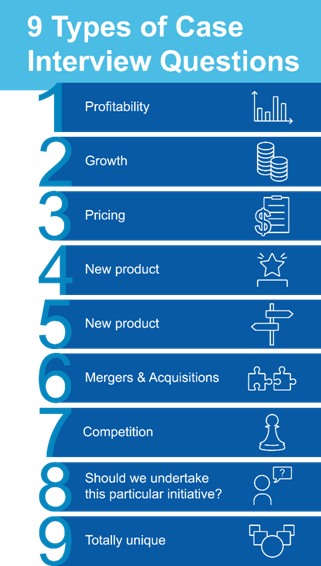
Being familiar with these types of case interview questions will reduce the odds of getting caught off-guard during an actual case interview and will help you ace the case. But I don’t recommend spending too much time agonizing over this list.
Rather, the value comes from understanding how these types of questions fit into the role of a management consultant. Remembering that a case interview is essentially a simulation of what you will experience on the job. Look at these of questions in the context of how they would relate to business problems that clients encounter — not in the context of impressing your interviewer.
Preparing for these types of questions will help you best prepare for a case interview. Showing that you can successfully maneuver a case interview will show your interviewer that they can trust you to handle these issues with a real-life client.


